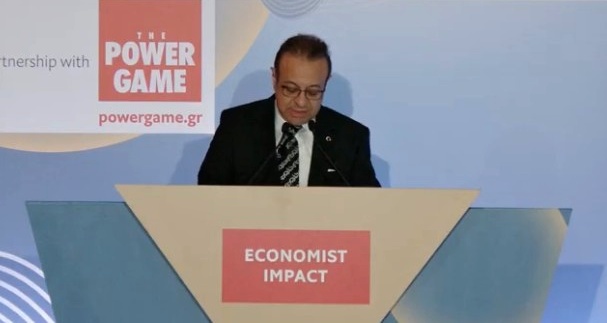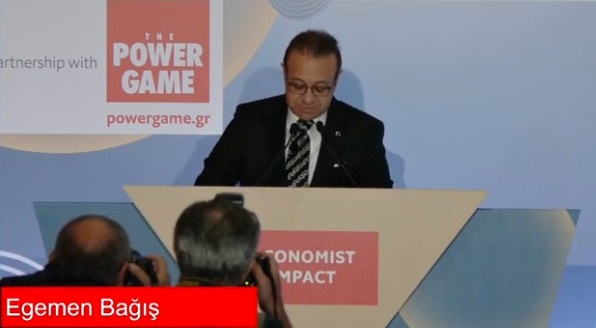Egemen Bağış on Europe & Turkey Recalibrating a strategic partnership
Prgue/ Thessaloniki, September 7, 2025
Distinguished Guests, Ladies and Gentlemen,
Let me begin by extending my heartfelt appreciation to the organizers — The Economist Impact Events Management team — for convening this distinguished forum and for granting me the honor of addressing you today.

Addressing this prestigious audience in Thessaloniki carries a special meaning. This historic city, a crossroads of civilizations, has for centuries been a meeting point of cultures, faiths, and ideas. It is also the birthplace of a great statesman — the founder of the Republic of Türkiye, Mustafa Kemal Atatürk. A visionary leader, Atatürk anchored our nation upon the principles of modernization and aspired to bind it more closely with the West. In that spirit, the subject of my remarks today — Türkiye’s engagement with European institutions — is not merely a matter of current policy, but the continuation of a vision woven into the very foundation of our Republic.
I am equally pleased to express my profound gratitude to my esteemed friend and statesman, His Excellency Dimitris Avramopoulos, whose kind support has made my presence here possible. Our friendship spans across three decades, and it was enriched by a unique chapter in history when he served as Mayor of Athens and President Erdoğan as Mayor of Istanbul. Their relationship, built on mutual respect, stood as a safeguard of peace between our nations, even in difficult times. Efharisto poli, dear Dimitris.
I must also take a moment to honor the memory of Yiannis Boutaris, former Mayor of this great city of Thessaloniki. He was a visionary and a friend. At a dinner in Istanbul hosted by His Holiness Patriarch Bartholomew at his home, Yiannis once told me: “Egemen, as Greece is in the EU, we are partners with many countries. But with you Turks, we are like cousins. Except for language and religion, our cultures are so similar. We have far more in common with you than with many others in the Union. That is why we want Türkiye to join.” May he rest in peace.
Ladies and Gentlemen,
Today, Europe stands at a crossroad. The economic and political certainties of the past are fading.
Three seismic events have reshaped our world:
• the war in Ukraine,
• The tragic and inhumane atrocities which can be defined as a genocide attempt in Gaza led by Prime Minister Netanyahu, and
• the continuing consequences of regime change in Syria.
Each has tested the EU’s capacity not only to project influence externally, but also to maintain internal unity and cohesion.
The war in Ukraine exposed Europe’s dependence on Russian energy and revealed weaknesses in its defence industry. The COVID-19 pandemic had already exposed vulnerabilities in supply chains and coordination.
The genocide in Gaza has revealed deep moral weaknesses of foreign policy divisions, while the situation in Syria continues to generate refugee flows and security challenges.
Together, these traumatic events highlight the urgent need for a renewed vision of European security—one that bridges the gap between EU and non-EU allies, and redefines Europe’s place in the transatlantic alliance.
“Europe cannot afford to be divided abroad while it is uncertain at home.”
To its credit, the EU has begun adapting.
• The Strategic Compass (2022) charts a defence roadmap to 2030.
• The Competitiveness Compass (2025) strengthens Europe’s economy and resilience.
• REPowerEU seeks to end reliance on Russian fossil fuels by 2030.
• The European Chips Act boosts semiconductor independence.
• The Global Gateway strategy mobilizes €300 billion for infrastructure worldwide.
• Most recently, the ReArm Europe Plan and the White Paper for Defence Readiness 2030 seek to transform Europe’s defence industry.
The direction is clear: defence, resilience, and competitiveness lie at the heart of Europe’s future.
“Strategic autonomy is not a slogan — it is a survival strategy.”
But this raises a fundamental question: Can the EU truly achieve strategic autonomy without Türkiye?
Türkiye welcomes the EU’s ambition to become a robust actor in the security domain. We are ready to contribute—not only as a neighbor, but as a NATO ally, a strategic partner, and a candidate for membership.
Our defence industry is strong and innovative.
• Türkiye has NATO’s second largest army, ranked 9th worldwide in 2025.
• Our defence exports exceeding $7 billion last year.
• We are among only five nations worldwide capable of producing a next-generation fighter jet.
• Platforms from the Altay tank to the MİLGEM frigates, from the Anka and TB2 drones to the Kaan fighter jet.
These are not only Turkish national assets—they are potential European assets.
This is why Türkiye’s participation in the SAFE (Security Action for Europe) initiative is not optional but necessary. We have already expressed readiness to join joint procurement projects under SAFE. With a defense industry as capable and as robust as ours, Europe would be losing a valuable ally by neglecting Turkiye.
Unfortunately, some member states continue to block such cooperation. This is not only shortsighted but damaging to European security interests. Defence collaboration must be guided by merit and shared interest, not by narrow politics.
Excluding Türkiye weakens Europe’s defence ecosystem and undermines its own autonomy. History has shown that Türkiye has often been Europe’s first line of defence. You never know, we might have to come to Europe’s rescue again suddenly one day. As we did throughout the Cold War.
“A Europe that sidelines Türkiye is a Europe that sidelines its own security and future.”

Our partnership is not limited to security.
Türkiye is the EU’s fifth-largest trading partner, and the EU remains Türkiye’s largest. We secure supply chains, strengthen critical industries, and serve as a vital energy corridor linking Europe with external resources. Türkiye holds a pivotal role in Europe’s connectivity — in trade, transportation, energy, and digitalization. Europe’s supply chains, as well as its food and energy security, have become more resilient thanks to Türkiye’s strategic assets — from Istanbul Airport, one of the largest in the world, to major pipeline projects such as the BTC.
“Without Türkiye, Europe’s map of energy security is incomplete.”
Yes, we have had differences. But disagreement should never mean disengagement.
Enlargement today is no longer a technical process—it is a geopolitical necessity. The war in Ukraine has accelerated the EU’s enlargement agenda and its need for partners. Türkiye must not be left out of this momentum.
Furthermore it would be unrealistic to expect Türkiye to contribute strategically to Europe’s security while being excluded from its decision-making structures.
“You cannot ask Türkiye to carry Europe’s burdens while denying her a seat at the table.”
A fair and credible enlargement process is Europe’s best investment in peace, stability, and long-term security.
Let me close with this:
Türkiye’s alignment with EU security and defence initiatives can only be sustainable if it is matched by renewed momentum in our accession process.
Türkiye does not seek to remain in the sidelines. We seek to stand shoulder to shoulder—as a full member of the European family.
“Türkiye is not Europe’s neighbour. Türkiye is Europe and her future.”
The challenges of our time demand not just cooperation, but unity. And unity demands courage. Thank you for your kind attention.

